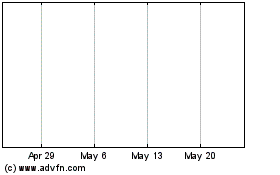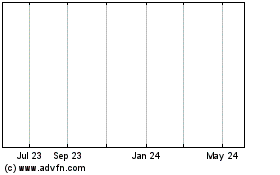Denver Apartment Empire To Be Broken Apart, Sold
October 11 2011 - 1:47PM
Dow Jones News
Kal Zeff spent several decades building a Denver apartment
empire. Now, more than six years after his death, his children are
cashing out.
The Carmel Cos. portfolio, which contains more than 7,500 units
across 22 properties, is under contract to be sold to about a dozen
different buyers in deals expected to close by the end of the year.
The listing price for the whole portfolio was more than $900
million.
The deals are being closely watched for signs of continued
strength in the market for multifamily apartment buildings. For
most of this year, that market has performed strongly as rents and
occupancy rates have been driven higher by demand from millions of
former-home owners-turned-renters.
But with worries about the economy growing, it is unclear
whether values will continue rising at the same rate. This summer,
the owners of another closely watched portfolio, Archstone, sought
buyers for the giant apartment company but didn't get high enough
bids for them to reach an accord on how to proceed.
As a result, two of the owners, Barclays PLC (BARC.LN, BCS) and
Bank of America Corp. (BAC), have decided to sell their collective
stakes while the third owner, Lehman Brothers Holdings Inc., has
decided to hold on.
If the Zeff portfolio obtains its asking price, it will be a
sign that investor appetite remains strong. It would also be one of
this year's largest multifamily portfolio sales, according to
brokerage Marcus & Millichap.
The Zeff sale will be "an important indicator of where the
market is right now," said W. Bradford Blash, chief business
officer of Crossbeam Holdings LLC, a multifamily investor that
recently entered the Denver market.
The strength of the market earlier this year was one of the main
reasons that Zeff's four children--Ron, Diana, Michael and
Dana--decided it was a good time to sell. "Things are looking very
frothy and the company was looking to sell at the peak of the
market," said Gil Rudawsky, spokesman for Carmel Cos.
Ron Zeff manages the family's Denver portfolio through Carmel
Partners, a separate real estate company he founded that invests in
other apartment buildings nationwide. There was no debate among the
four siblings about whether or not to sell, Rudawsky said.
Kalman "Kal" Zeff started Carmel Cos.--named after a well-known
site near his boyhood home in Israel--in 1965 with a $5,000 loan.
He developed dozens of apartment complexes in the Denver area.
The apartments are described as mostly "Class B," a designation
assigned to older properties. While some have been upgraded, some
don't have cutting-edge amenities like state-of-the-art gyms with
personal trainers and theater-style television rooms. Built between
1977 and 2001, the properties range in size from nearly 200 units
to more than 600, according to the marketing brochure. The monthly
rents range from $720 to $1,870.
Brokerage CBRE, which began marketing the apartments in June,
said more than 400 confidentiality agreements were signed by
parties seeking more information--double the typical amount. More
than 50 groups submitted bids, said Vice Chairman Tyler Anderson,
part of the CB Richard Ellis team working on the sales.
Apartment vacancy rates have been falling in the Denver region,
which has nearly three million residents, as they have in other
parts of the country. After peaking at 8% in 2009, the national
vacancy rate fell to 5.7% in the third quarter, down from 7.1% a
year earlier, according to preliminary data from Marcus &
Millichap. Denver's rate fell to 4.5%, from 5.7%.
Crossbeam Holdings bid for eight Zeff properties but dropped out
because prices got too high, according to Blash. His firm recently
acquired Summit Ridge, a 360-unit Denver apartment community
similar to Zeff's offerings for approximately $31 million, or a
6.2% yield. Blash said his firm paid $86,000 per unit.
Blash predicts the Zeff portfolio will sell for well more than
that, with average initial yields ranging between 4.75% and 5.75%,
with an average of 5.25%. The lower the yield in a sale, the higher
the price.
Blash said his firm looks for underpriced properties where it
can "add value" through better management and upgrades. "The final
pricing [of the Zeff portfolio] took the value out of value-add,"
he said.
-By Dawn Wotapka, Dow Jones Newswires; 212-416-2193;
dawn.wotapka@dowjones.com;
Lehman (NYSE:LEH)
Historical Stock Chart
From Jun 2024 to Jul 2024

Lehman (NYSE:LEH)
Historical Stock Chart
From Jul 2023 to Jul 2024
